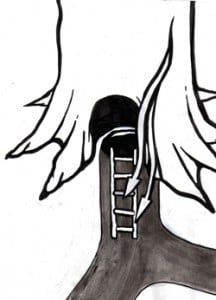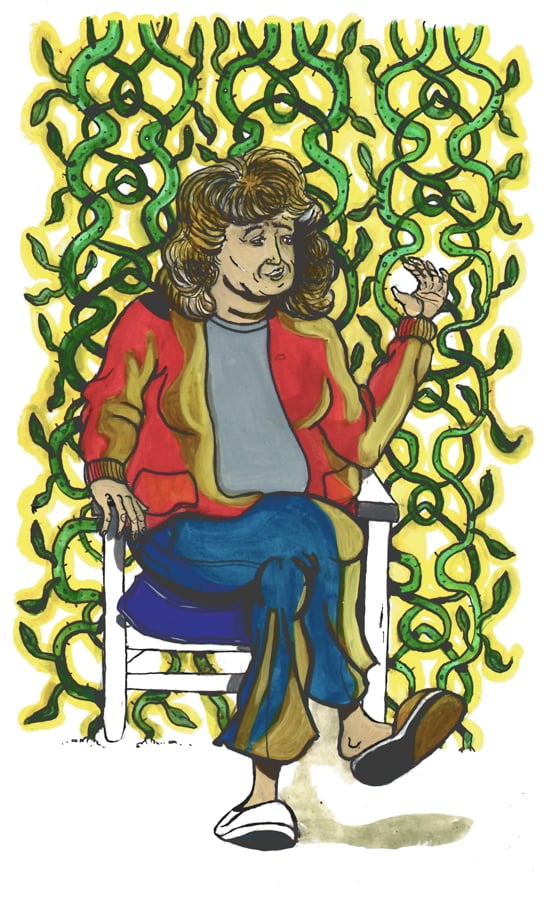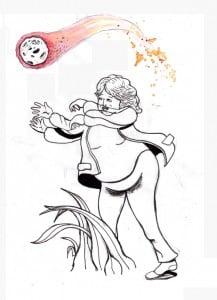Linda (20)
By:
November 3, 2011
HILOBROW is proud to present the twentieth installment of Karinne Keithley Syers’s novella and song cycle Linda, a hollow-earth retirement adventure with illustrations by Rascal Jace Smith. This is the final chapter of the story, but the line dance instructional appendix will be appearing on a few subsequent Thursdays.

The story so far: Linda is underground. She has been shown the many labors that have prepared this for her. Nothing is left but to sing her out.
36.
Norah moved to a condo in Tulsa near her grandchildren. Arlene sold her house and moved into a retirement village. Bonnie and Meyer moved to a place in Florida, on a golf course, but ran out of money and had to move somewhere smaller. Sarah stayed in her house way out in the hills but got more dogs.
Doris moved in with her daughter. Arthur had a heart attack very young. Yvette and George stayed in their home with the television on, and got a nurse. Tilly’s daughter hired a college student to move in and caretake in exchange for room and board. Linda R. sold her house after her husband died and took a small apartment in a retirement complex on the outskirts of town and complained that no one ever visited, which was true, they didn’t. Frank remarried, a younger woman, and they got a condo on the gulf coast. Someone else moved to Texas. Patricia fell and went into an assisted living facility. Millie ran out of money and went into a government home. Caroline took a one-bedroom apartment in a senior home. Franklin had to go into a care home because he couldn’t remember his name. Al hired someone to live in with him at the hostel.
In their new apartments they could read. They could do watercolor class. They could watch television in the community room or alone in their room. They could take the shuttle to the grocery store. They played bridge and the lucky ones took exercise classes where young women with long red hair taught them dances they could do in their chairs. Maybe they thought about non-attachment. Maybe they thought only of filling the time.
I am sitting with Linda.
What about a home in the mountains, I ask her. There could be a national system where young adults become caretakers on mountain homes. You could choose if you wanted to live in a little village cluster or something very remote. It wouldn’t be an industry. No one would be employed. The food would be real, and made to your liking.
Could I eat dinner with people? asks Linda.
When you wanted to, I say. You’d have to choose a cluster. Or there could be special dinners for the remote ones.
If I was to go, says Linda, to a mountain, to be tended to, I would like it to be Bess who came with me to do the tending. I would like to change Bessad to Bess.
Okay, I say. Bess.
Bess would stay with me and we could run the house together, just if I wanted to I could slow down.
What about visitors? I ask.
I’d like that, says Linda. I’d like visitors.
I could arrange this for you, Linda, I say. If you want.
I could make it so all the young people would do this just like Bess. And the young people and the old people would choose each other. The young people would not be employees because this would be a part of their living too. They would learn to take care of houses and to cook and how to be slow. Certain times of the day would be empty. They would be times to practice emptying. There would be movie screenings but no televisions. And there would be bands, bands of the old people and bands of only young people and then also intergenerational bands, and the bands would give concerts. If they wanted to the old people could write. They would write memoirs, but only fake ones. Not their own lives but memoirs of imagined other lives. They would give readings, or have their caretakers read it back to them. The movies and the concerts and the readings, and then the serenity of the mountains: this would be enough. The young people wouldn’t have to think about starting their careers until their 30’s, until they had finished their time in the mountain homes. The old people could live as they chose, with the single restriction that there would be no medication. The point of going to the mountain home would be to accept the process of a body’s slow ceasing. This is the hardest and most important part. Everyone would get to choose when they wanted to go to the mountain homes. But when they got there they would submit to their body’s time. There would be no bills or rent. When the young people were done being caretakers they would leave the mountains and go back to the towns, but they would understand things like being responsible for dinner and how to be quiet and the wide variety of food preferences and the need to work more when others need to be slow, and what to do when someone dies. And so they would make better workers because by the time they got there they would care less about certain things and more about others, and everyone would be more gentle and sing more and be better at cooking.
If I wanted to take a drive, there would need to be a car available, says Linda.
Fine, I say.
The food would have to be cooked the way I want it. The way any one of us wanted it.
I agree. I nod.
And the food would have to be better.
Yes, I agree, I say.
Sounds good, I say.
And Linda what about dying, I ask. Would it be alone or with Bess?
And Linda says, (nothing) .
Pauses and again says, (nothing) .
I don’t know yet. Eventually that’s what she says, I don’t know yet.
(However premature, the question hovers. If after retirement comes the diminution of the body’s health, and after that comes on some night or another in a bed, a stilling, and a slipping out, it hovers.)
Along the shoreline of a shrinking sea, a scattering of tents.
Along the sides of a hill under broad trees, a scattering of tents.
Along the slopes of a dense and dirty city, electric lit and noisy, a scattering of tents.
Along the train tracks, any train tracks, a scattering of tents.
In a factory anywhere that makes anything, a scattering of tents.
In one of these tents I am imagining Linda.
In one of these tents maybe Linda is imagining me.
Linda, I ask, how did your father die? I am sitting at the threshold of her tent and the golden hour is just becoming the time when the blue without grey settles on us and occupies our eyes and becomes what we see. Did he die alone in the room at night? Had you gone home? Were you just out of the room? Were you fetching something? Did you know it? Was he awake? Asleep? Was it painful? Did he want to be alone? Were you adequate to accompany him? Should there have been others? Or other things to accompany him? Things we don’t count as individuals? Was it morning? Were there particles of dust spinning in light cutting through the shades? Had you drawn the shades? Did you imagine him identifying with particles of dust or cutting sunlight? Were there fruit trees outside? Did he want sun on his face? Was he coughing? Was he relaxed? Did you tell him to relax? Did he know who you were? Did you feel you were who you are? Did he have to be restrained? In his own bed? A hospital bed? Medicated? Was a nurse there? Did you sing? Was there a pet? Did he feel abandoned? Was he surrounded? By what? Could you tell? Did he speak? Did he see anything? Did he cry? Did you? Did someone have to call you or did you know? Were his eyes open? Was your hand on his hand? Were there photographs around him? Was he in his own home? Was he ill? Was it fast? Was he glad?
Along the highway by the malls, a scattering of tents.
Along the cul-de-sacs and among the houses a scattering of tents.
Along the stairwells of apartment buildings, a scattering of tents.
In each tent a light. Each light a tent for a night.
What if I choose not to become fragile, says Linda. What if I’m glad to be alive, she asks. What could you do for me?
I am looking at Linda’s face. In my mind I’m looking at her face. I can’t see it completely, only one attribute at a time. It’s surrounded by blonde to whitening hair that reaches her shoulders. Over her shoulders come the straps of a blue denim jumper and she wears a white shirt underneath. I will probably dress this way too, some day. I probably already do. I can see that her skin is somewhere between fully fleshed and papery. I can see that her hair is somewhere between blonde and white. Like me she looks much younger than she is. When she sleeps she looks unhappy. Linda sleeps sitting up. She cries things like “eggshells, Eggshells, Eggshells!” in the night. Parts of her are already fragile, even though she curses and is willful and looks much younger than she is. I remind her of this. She looks at me. Let’s say her eyes are brown. I don’t remember but let’s say they are. I imagine her looking at me with brown eyes. I glance to the side.
Light spills onto the couch where I am sitting in this room where I am looking in my mind at Linda. I can see among the lineated shadow of the open blinds the shape of a woodpecker who is just now behind me putting an acorn into a hole in the house right behind us. The outline of the window is overwritten by the shaking shapes of trees, except for the spaces where bright clear lines cut across the parts open all the way to the sky. It is exceptionally windy today. On the arm of the couch moving up the same lines cut, bending backwards toward the window on an upward diagonal. My dog is waiting for me to walk her or to let her outside, but the neighbor’s cat has been crying outside and I’m afraid she will terrorize it. What if I choose not to become fragile, asks Linda. The bird is gone. The dog is still waiting. As I tried to take the measure of my consciousness, I learned to live in it more, I say to Linda. Listen. As I tried to take the measure of my consciousness, I learned to live in it more. It is Henry James who said that and now I am saying it to Linda, and she repeats it back to me. I learned to live in it more.
I could make you a room, I say. A room away from the world, and the room could alight, and there would be singing, because I think you would like singing.
And dancing?
Yes, dancing too. For a short period of time I could make the room light up and sing to you. Then dancing.
And then?
Ringing.
And then?
Nothing. You tell me when.
37.
Linda takes her seat in the great room of a hollow chamber that has been prepared for her under the ground. Under the great fish-scaled globe that hangs suspended in the middle of the room, all the scaffolding has been reconfigured into something like a floor, a floor suspended across the middle of space. Linda sits in the only chair, a chair in a box built into a wall whose glowing veins of bioluminescent algae have been trained into the shapes of ivy. At her feet, a dog called dog-Linda lies with her head pressed onto Linda’s foot. Blinds are drawn across the mirrored tunnels that reach to the surface and the room goes almost to black, but for the light spilling from the ivy patterned walls. A pitch pipe sounds. A single tunnel’s cover is pulled back and light bounced down across small mirrors cut into angles and placed to deliver the last light of the surface world to this underground hollow. The light falls on the faces of two young women standing on the scaffold floor. They start the singing.
What follows is private. We ask for your quiet. They sing the old songs. The ones Linda has known since childhood. Then a new song. Then songs without words. There are more of them than she can count easily. She remembers them all, from some forgotten place. The singing stops. The singers now stand in a semi circle. A floor is laid across the scaffolding. Someone comes out in bare feet and stands in the center of the floor. Linda cannot tell if it is a man or a woman. It doesn’t matter. Look at the fingerbones of the others, as they stand on the circumference. How they shift their hands and face their palms out. When they do this something like a chord, a deep drone, sounds. Then one by one in perfect sequence they move their fingers. As each hand shifts a different ringing tone sounds in the room. A handbell chorus without bells. Imagine the most strange and delicate and spooky action you can. Imagine that the one who does this action does it simply, as if inviting you just to see it in its most plain actuality. Imagine that it doesn’t worry you, that it explains nothing. Imagine only that you love to look at it.
Now it is time for Linda to join. Light bounces onto the globe that hangs above the dance floor. Millions of fish scales give their light to Linda. Linda receives the light of millions of fish scales. She gives them thanks. She walks to the corner and chooses a record. Everyone joins her on the floor. The record is started. From somewhere in the great room someone calls the dances. They dance the twelve dances I made for Linda.
When they are done, they sit in a square and begin the singing. When it is Linda’s turn to choose, she calls for no. 49b, Mear. She stands in the center of the square and the voices stream at her from the four directions, waves of sound moving into the liquid in her body, into her gut and across the tissue of her muscles, her marrow, moving across the spaces in her lungs and vibrating the fluid that runs from her brain down her whole spinal column. She is a spine, a bundle, a set of bones balanced on bones, surrounded by fluid, vibrating, receiving, happy. The singing increases as the light diminishes. Becomes noise. Becomes ringing. And then nothing.
Somewhere in Knoxville or Nashville a kid in the summer cups his hands around a firefly on the lawn of his grandmother’s house, as I once did on the lawn outside my grandmother’s club somewhere just outside of Philadelphia in a humid dusk light dropping through arrayed green tones, while the adults sat on a screened-in porch drinking coffee. I wonder, when my grandmother’s house was sold to a developer, what happened to her rooftop greenhouse, to the tiny door that was really a window, hardly a person-sized entrance to the outside, secured by a padlock and a little sliding lock. You would pass through the greenhouse and onto the deck, and from the deck walk to the edge and from there look down the long front of the tall building through the leaves of gingko trees to the sidewalk below, where maybe someone was passing.
Somewhere in Nashville one of Linda’s children is standing in a warm shower at the beginning of the day, thinking of Linda, and is struck by a sudden and buzzing closeness of a something, a something warm and present that vibrates like a bee passing close to your ear and also like the sudden appearance and recession of a quantity of life, as I too have been visited, in a shower one morning with fruit trees outside, having been absent at the moment of death, having flown across the country to this house of such a long retirement that I do not even remember another, having come to remember and to comfort and to pack. A last gesture from or toward my grandfather, a perfect sensation, like the displaced air from the path of a passing comet on its way out to space.
I wrote this in his notebook. Many blank pages follow.
And now, listen to the goodbye medley, which ends the Linda song cycle,:
Goodbye Linda
STILL TO FOLLOW: Instructional Appendix for the 12 Line Dances Stay tuned!
Karinne and HiLobrow thank this project’s Kickstarter backers.
READ our previous serialized novel, James Parker’s The Ballad of Cocky The Fox.
READ MORE original fiction published by HiLobrow.


